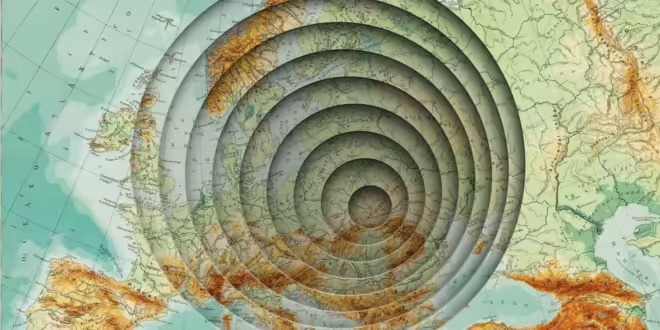Janan Ganesh
A lack of rare earths is just one way in which nature disadvantages the continent

As the European wine harvest ends, we might reflect on that controversial word “terroir”. It is hard to define but tends to refer to the non-human factors of production: the geographic givens of a vineyard. Weather, soil composition, angle of sunlight, surrounding plant life and so on. Some believe that no amount of technical skill in the hands of a New Zealand pinot noir maker can compensate for the magic of Burgundian terroir.
Mumbo jumbo? An Old World excuse for high prices? Well, we Europeans must cling to whatever natural assets we have. Look around.
According to the US Geological Survey, China’s known reserves of rare earths are more than twice that of the next luckiest country, which is Brazil. No nation in democratic Europe makes the top 10. (Greenland, a distant and autonomous territory of Denmark, is eighth.) As rare earths go into aircraft engines and all manner of consumer electronics, China can squeeze other countries, to the extent of restricting the end use of a particular shipment. Even Donald Trump, who had hoped to tariff China into submission by now, has to reckon with its indispensability in supply chains. Look at his solicitousness towards Japan and resource-rich Australia — but not towards Europe, where rare earths are beyond rare.
The situation is not much better in matters of energy. At the end of 2020, Europe had 1.7 per cent of the world’s proved natural gas reserves. China had 4.5 per cent, the US a bit more, Russia 20 per cent and the Middle East 40. Uncoincidentally, Europe has high energy costs — Britain’s in particular could thwart its AI ambitions — and Russia has been able to withstand western sanctions since it attacked Ukraine. World events hinge on the location of fossilised plankton remains from millions of years ago.
There was a time, in the half-century or so between the Opec crises and the Ukraine war, when it was possible to forget about geography. One place could be much like another, if it had enough knowhow. Singapore and Dubai were models of how to prosper without natural advantages. (The latter is not, and somehow this still needs saying, a petro-economy.) Just as modern painting had evolved towards ever greater “flatness”, as the critic and Jackson Pollock devotee Clement Greenberg suggested, so did the world, in a case of life mimicking art.
Of course, even at the time, the post-geographic hype ignored some awkward facts. Having a coastline and therefore a potential port is a natural advantage. Which truly ill-favoured locations on Earth, such as landlocked and desertified Chad, were doing well? Few. But it took the war in Ukraine to smash the illusion of a flat world altogether. In a decade that has put the “geo” back into geopolitics, Europe stands out as a place short-changed by nature, not just compared to the superpowers but to the likes of Canada. Even aside from the continent’s scarce resources, there is its proximity to such trouble spots as the Sahel and the Middle East. And don’t forget the European Plain itself. The lack of geographic barriers to invasion has fed nationalist paranoias from Prussia to Russia.
At this point, it is customary to laugh at those liberals and their naive hopes of a seamless planet. As I remember, though, the geography-is-dead crowd were often conservatives, at least in Britain. There has never been a bigger statement of belief in a flat world than quitting your own regional bloc to go “global”, on the hunch that technology has abolished distance.
Well, as Brexit continues to please no more than a third of voters, and the Labour government creeps nearer the EU, something should be dawning on people. Britain is, for better or worse, European. It is not just that its per capita income is much nearer that of the EU than that of the US. Or that British expectations of the welfare state are more Germanic than American, as every government that tries to cut it finds out.
Above all, Britain is geographically challenged and so is most of Europe. Even oil-blessed Norway has a Russian land border to reckon with. British headaches — irregular migration from Africa and the Middle East — are French headaches, not Anglosphere ones, for reasons that are obvious to anyone with a map. When the decennial of the referendum comes around next summer, it will have to be explained to people who were children at the time that grown men and women thought we could escape the basic Europeanness of our situation through trade deals with Australia and saying “buccaneering” a lot.
When Trump has his much-anticipated meeting with Xi Jinping this week, Europe will resemble a child looking up at two parents squabbling over its head. Successive generations of European leaders deserve all the criticism in the world for letting the continent become the cringing vassal that it is today. The military neglect, the preference for a “social market” over growth at all costs: these were life-and-death errors, smugly made.
Just one thing can be said in mitigation. Geographic facts were and are against Europe. The unequal distribution of certain resources around the world was going to tell in time. Better decisions would have softened the problem (Britain and Germany should have copied the French embrace of nuclear power, for example) but only up to a point. In the end, even if the human element had been first-class, the terroir was bleak.
 Geostrategic Media Political Commentary, Analysis, Security, Defense
Geostrategic Media Political Commentary, Analysis, Security, Defense





